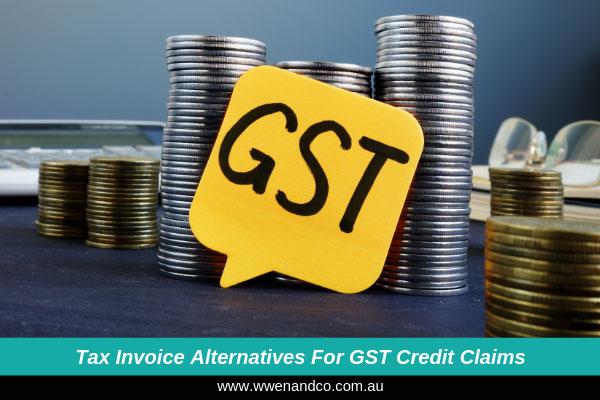Alternatives to a tax invoice for certain GST credit claims

Tax invoices are an essential element of Australia’s taxation system and serve both to collect taxation revenue related to the goods and services on which GST is levied as well as record the credits that are claimable by eligible businesses.
A business registered for GST will generally be required to hold a tax invoice for any transaction in order for an input tax credit to be claimed. The tax invoice can usually only be issued by the entity that made the taxable supply, which generally must issue a tax invoice as a normal incident of transactions, or within 28 days of a request to do so.
Tax invoices are not required where the GST-exclusive value of the transaction does not exceed $75 (that is, a GST-inclusive price of $82.50) or if the goods or services supplied are GST-free, such as many food items. (And if you are wondering why $75, it’s merely a reflection, in miniature, of the turnover threshold of $75,000 at which a business must be registered for GST.)
To qualify as a bonafide tax invoice, it generally must include certain details, such as the seller’s identity (name, ABN), date, the form of supply, the price, the GST amount and so on.
Failure to issue a tax invoice is subject to an administrative penalty
Suppliers who fail to issue a tax invoice or adjustment note as required are liable to an administrative penalty from the ATO. If a tax invoice or adjustment note is not provided, it is generally expected that the recipient will make genuine reasonable attempts to request one. The emphasis however is on “genuine reasonable attempts”, as the ATO does not generally require anyone to go to extraordinary lengths to pursue a supplier for the tax invoice.
If a tax invoice or adjustment note is not received within 28 days after the request, the erstwhile recipient may need to contact the ATO for assistance, providing details of the transaction and details of attempts to request the document. We can certainly help you with this.
How to claim GST credits where no tax invoice is available
There can be instances however where a recipient is unable to obtain a valid tax invoice after making all reasonable attempts. In these cases, there are allowances under the tax rules that let the ATO exercise a discretion to treat another document as a tax invoice. For example, if second-hand goods have been acquired from a registered seller and the business has made a record of the acquisition, or if creditable acquisitions are made of “reverse charged” supplies (ask this office what this means if it seems applicable).
Other instances of an option being available to claim GST credits where no tax invoice is available include the following:
Progressive supplies
Certain rulings issued by the ATO contain guidelines on tax invoice requirements for taxable supplies that are provided on a “progressive or periodic” basis, where each progressive or periodic component of the supply is generally treated as a separate supply.
The relevant ATO ruling in these cases states that a single document can be a tax invoice for all components of the supply if it satisfies the tax invoice requirements and shows the price of each component of the supply.
A lease document therefore can be used as a tax invoice for each monthly rental, as long as all the requirements are satisfied. As a supplier, a business therefore does not have to issue separate tax invoices for each component of the supply.
Note however that if there are price variations for supplies made on a periodic or progressive basis (for example, lease payments adjusted for CPI or lease payments that include an amount for outgoings) and the taxpayer needs to rely on other documents, the exercise of a discretion from the ATO may be required.
Note also that if a business uses direct debit facilities, it would be advantageous for all parties to ensure that the lease document meets the requirements of a tax invoice to avoid the need to issue a separate tax invoice for each periodic payment.
Corporate credit card statements
In the case of a corporate credit card statement, as it is not being issued by the actual supplier of the goods or services, it would not normally qualify as a tax invoice. However, the ATO has issued a ruling that allows businesses to claim input tax credits based on corporate credit card statements from approved corporate credit card providers where certain conditions are satisfied. These generally relate to the sort of information that is able to be accessed from the statement.
Generally, the credit card statement can only be used to claim the input tax credit where the supplier is making a taxable supply (that is, it is not a mixed supply) and the GST is exactly 1/11th of the supply. If the supply is a mixed supply or a taxable supply where GST is not 1/11th of the price, a tax invoice may be absolutely necessary to substantiate the input tax credit for the supply.
A condition required is that a supplying business has an effectively regulated corporate credit card policy that makes adjustments for circumstances when the card is used for private or personal expenditure.
Offer documents
Subscriptions and renewals may be treated as tax invoices even though they are issued before supply is made. The ATO will generally allow such offer documents to be treated as a tax invoice if they:
- Meet the requirements in respect of the total of all supplies being offered when issued by the supplier
- Indicate which supplies have been accepted, the total price and amount of GST payable in relation to what is supplied when completed by the prospective recipient.

